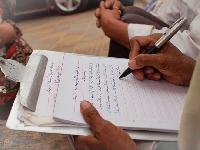| Pages in topic: < [1 2] | Reading while translating (and not before!)
|
|---|
| | | References!!! | Jul 25, 2016 |
Tomás Cano Binder, CT wrote: Lingua 5B wrote:
But in today's world of instant everything, yes, just mix it up and translate quickly. : D It is not a matter of translating quickly at all. In fact, preserving the foreignness in a source text and translating in a more "Saussurean" way (i.e. sticking more to the source text and its rhythm, sound, and minute effects) both take a terribly long time and requires quite a mental effort.
Nice to see someone referencing Saussure and Venuti on this site, for once!
| | | |
Jack Slep wrote:
I've been R>E translating scientific/technical journals on 70 different subjects on a daily basis for 65 years (I'm 85) and have never pre-read thousands of articles, or 10 or so books. I start with the first word and just keep going, adjusting the syntax/active-passive as needed, and researching my very large R, R>E., RE, ER library on a multitude of subjects as required. Perhaps if you do literary translations a "panoramic view" of what lies ahead and a preliminary skim (or in-depth) perusal is needed. But for the most part sci/tech is straight forward, succinct, to the point (except for authors who like to hear themselves) and can be translated from the start, from the git-go. But I guess after 6+ decades, since the Korean and Cold Wars, I've gained some knowledge about the different styles of authors and publishers and can proceed "from the start." The "thing" with sci/tech, though, is vocabulary. I'd wager that better than half those such words didn't exist when I began as a full-time freelance translator in 1966, or even the very sci/tech fields: magnetohydrodynamics, molecular genetics, solar power engineering, robotic surgery, etc. If you're comfortable pre-reading, do so. If you have competent knowledge of the subject, go straight to it and save time and money. Or select the options that makes you the best translator with the best product. Nothing is cut-and-dried in this profession, but use the greatest machine ever conceived--your brain--not some alphabet---CAT, MT, TM, TRADOS, etc., crap in, crap out; quantity in, bovine excreta out, forgetting quality; client's original product in, required product out before you got the original; $$$/??? it's in the mail, paid in Zambia currency, zebra zeroes. Being a professional (I hope!) translator all these decades, at least in my R>E combo, with literally millions of words translated, I've seen this honorable profession deteriorate from human to subhuman alphabets to demands to use various "machine products" developed by electrons, protons, neutrons, and morons. I'll give them a recent article I did on "Periglacial Geomorphlogy." Shove that through MT etc. and I'll probably get "Martini, go lightly on the ice around the G-spot rim" Of course, that's more erotic than my translation and will garner more readers. Don't blame them. Well, obviously, I'm the Ancient Translator, so I'll sign off. Probably didn't answer the original question, but do what is best for you--you don't need opinions, you only need yourself.
I should probably also celebrate mention of the G-spot too.
| | | | | Meaning is not a sacrosanct value | Jul 25, 2016 |
SNEH SHARMA wrote:
A good translator can translate in a naturalized way, staying true to the original.
I don't quite agree. Domestication/naturalisation completely alters the taste of a source text and makes it much more prone to unwanted alterations of rhythm, tone, register, semantic richness...
In the opinion of numerous scholars, the translation should not limit itself to conveying the meaning as the one and only value in a text: it should also preserve as much as possible of the 'foreignness' of a text, thus making it not only more interesting and nourishing to the reader, but also closer to the experiences and effects the author seeked with the exact way in which the text was written.
| | | | | do like the author | Jul 25, 2016 |
Your colleague has an interesting point of view, although I think that reading the entire book before is better.
The writer writes knowing the end of the story (even if sometimes they don’t know exactly what will happen between the first chapter and last one ) and knowing details are important. ) and knowing details are important.
| | |
|
|
|
James Kim 
Philippines
English to Korean
+ ...
| It depends on your due date. | Jul 25, 2016 |
In my opinion, it depends on the due date. In case of literary translation, if there is an enough time to translate a book, you can read the entire book before you start your translation. However in case of technical translation, there are many urgent jobs to translate manual books. In this case, reading the entire manual book is not required before its translation.
[Edited at 2016-07-25 23:35 GMT]
| | | | Kay Denney 
France
Local time: 23:36
French to English
Tomás Cano Binder, CT wrote: SNEH SHARMA wrote:
A good translator can translate in a naturalized way, staying true to the original. I don't quite agree. Domestication/naturalisation completely alters the taste of a source text and makes it much more prone to unwanted alterations of rhythm, tone, register, semantic richness... In the opinion of numerous scholars, the translation should not limit itself to conveying the meaning as the one and only value in a text: it should also preserve as much as possible of the 'foreignness' of a text, thus making it not only more interesting and nourishing to the reader, but also closer to the experiences and effects the author seeked with the exact way in which the text was written.
and sometimes the foreign elements need to be ironed out. In commercial translations, you need to make the reader click on "Buy now", and the fact that it was designed by a French company isn't necessarily a factor that would encourage such a click across the Channel. In academic texts, you need to iron out the foreign feel so that the text is accessible enough for readers to relate to the author's stance. In instructions, you just need to be able to find the information necessary for the product to work.
I was helping some musician friends with a press kit. They had written a text in their native language and had it translated into English. Then it needed translating into French. I recommended a particular translator who I know can give such texts that extra fanciful flourish required in French, and explained that it was because the text in English was very matter-of-fact. They were surprised because their original text had many lyrical elements that would not have worked in English. We ended up looking for a translator to translate directly from their original text into French, and the text was much better and better reflected their kind of music.
| | | | robertkpeace 
Australia
Local time: 07:36
Uighur to English
+ ...
| How Rabassa did it | Jul 27, 2016 |
The late great Gregory Rabassa translated as he read the first time through. Not a bad recommendation for that approach.
| | | | | It had never occurred to me not to read the whole thing until reading these postings | Jul 29, 2016 |
If you didn't read the whole book, you'd have to go back and change so much in light of what you then read and also revise consistency that you may as well just scrap what you have written.
Just to be able to answer questions about a book it needs to be read several times - to set questions, several more times. Translating it is then a meta-meta-activity and requires an even more thorough knowledge of the text, its nuances and overall meaning.
It is different if you are translating sh... See more If you didn't read the whole book, you'd have to go back and change so much in light of what you then read and also revise consistency that you may as well just scrap what you have written.
Just to be able to answer questions about a book it needs to be read several times - to set questions, several more times. Translating it is then a meta-meta-activity and requires an even more thorough knowledge of the text, its nuances and overall meaning.
It is different if you are translating shorter, more technical documents on a very tight schedule. If a book is to be translated on such a tight schedule that the translator doesn't have time to read through it a number of times beforehand, then that book is really not worth translating.
Clearly a lot of what we do as translators is arguably not worth translating, although for reasons of professional pride we never think of it that way. Why accept a meaningless commission, after all? However, if we are lucky enough to have the chance of translating a book, we will want to give it our best shot, presumably. ▲ Collapse
| | |
|
|
|
| many thanks Georgie for the Jack Slep | Jul 29, 2016 |
By the way, thanks Georgie Scott for the Jack Slep quote. I often feel a bit old-fashioned and reading the views of this master has made my day. I shall keep a copy on my desk.
| | | | mcorbach
Netherlands
Local time: 23:36
Member (2016)
English to Dutch
| interesting points made | Jul 29, 2016 |
I translate (young adult) fiction, not literature. At the moment I'm working on a historical novel, translating from English to Dutch. Before starting I will read four or five chapters, to get a feel for the tone, and to see how descriptive (or not) the author is. After that I start the translation, reading on as I work. I like to translate that way because it makes me feel as the reader feels. I mostly do medical texts, and the book translations are more for fun and to expand my vocabulary - th... See more I translate (young adult) fiction, not literature. At the moment I'm working on a historical novel, translating from English to Dutch. Before starting I will read four or five chapters, to get a feel for the tone, and to see how descriptive (or not) the author is. After that I start the translation, reading on as I work. I like to translate that way because it makes me feel as the reader feels. I mostly do medical texts, and the book translations are more for fun and to expand my vocabulary - that said, doing it for fun does not mean I can take as long as I want to. Sometimes I simply will not have the time to read a book first and then start on the translation. So there's that to consider as well. Another reason why I don't read the book first is... what if it turns out I don't enjoy the book? I'll still have to translate it. I'd rather be surprised, and do another readthrough after I'm done with the translation. That's the moment I can make changes if some foreshadowing did happen and I found out afterwards. ▲ Collapse
| | | | | Reading before translating is recommended | Jul 30, 2016 |
Tomás Cano Binder, CT wrote:
I entirely agree with the idea of NOT reading the entire book before translating.
We are very obsessed indeed with naturalising/domesticating translations as if it was the only valid approach. At the request of publishers, we (I mean the vast majority of the translation community) very much produce a pre-digested target text, instead of preserving the foreign traits of works as a potential source of delight and knowledge for readers. If I am allowed the analogy, we as translators swallow up works and regurgitate the ideas back onto the paper, thus feeding readers not only with something that has completely lost its flavour, but also with a lot of our digestive juices (or prejudice, our whims and habits, our personal perception of the source culture and of the nature of our own culture, the mental artifacts imposed upon us by our age...).
We are so obsessed with naturalised translations that many translators even think that Venuti was in favour of naturalisation/domestication! As Berman(1) put it, "The properly ethical aim of the translating act is receiving the foreign as foreign". By NOT reading the full book before translation, we stay closer to the foreign nature of the text and its mechanisms of strangement, fully experience its twists and can convey them better, and are better prepared to produce similar effects in areas that are often neglected, like rhythm, syntax, and even the sound of the source text.
(1) Berman, A. (1985/2004) “La traduction comme épreuve de l’étranger”, Texte 4 (1985): 67-81, translated by L. Venuti as “Translation and the trials of the foreign”, in L. Venuti (ed.) (2004), pp. 276-89.
Even as I agree with reproducing the foreign style in the target texts, it is very necessary to capture the global meaning of the source texts before stating the translation. For example some expressions could be implicit. Without first reading through the whole text, the translator may end up in mistranslating such expressions.
| | | | | Pages in topic: < [1 2] | To report site rules violations or get help, contact a site moderator: You can also contact site staff by submitting a support request » Reading while translating (and not before!) | Trados Business Manager Lite | Create customer quotes and invoices from within Trados Studio
Trados Business Manager Lite helps to simplify and speed up some of the daily tasks, such as invoicing and reporting, associated with running your freelance translation business.
More info » |
| | Trados Studio 2022 Freelance | The leading translation software used by over 270,000 translators.
Designed with your feedback in mind, Trados Studio 2022 delivers an unrivalled, powerful desktop
and cloud solution, empowering you to work in the most efficient and cost-effective way.
More info » |
|
| | | | X Sign in to your ProZ.com account... | | | | | |












